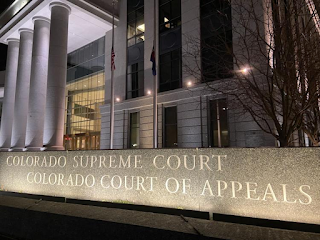Appeals court overturns conviction after video evidence contradicted security guard’s testimony
Weld County CO Feb 25, 2022 Store surveillance footage directly contradicted testimony that a man used force in his attempt to rob a Weld County supermarket, prompting the state’s second-highest court to overturn his conviction.
A three-judge panel for the Court of Appeals determined that witness testimony cannot sustain a conviction when undisputed video evidence invalidates what the witness said. As a result, “no reasonable person” could believe surveillance footage corroborated a security guard’s recollection that Jason Morgan Liebler had pushed him during the attempted robbery.
“Where there is a video recording of the relevant events,” wrote Judge Jaclyn Casey Brown in the panel’s Feb. 17 opinion, “we are in the same position as the jury to determine whether the video supports or contradicts a witness’ testimony.”
Ian P. Farrell, an associate professor of law at the University of Denver, questioned why Weld County prosecutors had even allowed the security guard to testify when they knew he was misremembering, exaggerating or possibly being untruthful.
“There is nothing of value to letting demonstrably false testimony to be given, and it has the possibility of confusing the jury,” he said. “That a prosecutor attempted to gain a conviction on the basis of evidence they knew to be false should shock one’s conscience, and goes against the prosecutor’s fundamental ethical duty to strive for justice, not a conviction.”
In December 2017, Liebler drew the attention of store security at a Safeway in Greeley. After filling his shopping cart with over $300 in merchandise, Liebler attempted to leave without paying. One security guard confronted Liebler at the entrance and halted the shopping cart with his hands. Liebler pulled the cart back inside and ran out.
At trial, the security guard testified that Liebler “decided to push the cart into me, pushing us outside the store,” and also that Liebler headbutted the security guard during his escape. A jury convicted Liebler of attempted aggravated robbery, theft, assault, felony menacing and possession of a controlled substance. He received a prison sentence of 10 years.
On appeal, Liebler argued there was insufficient evidence to prove that he committed attempted aggravated robbery. Under Colorado law, the offense requires someone to try taking anything of value using force.
Liebler pointed to the surveillance footage from the Safeway, which contradicted the security guard’s testimony that Liebler pushed a shopping cart into him. The lack of force called into question whether Liebler had committed attempted aggravated robbery after all.
“Rather, as the prosecutor even argued during closing argument, the evidence demonstrates that Mr. Liebler only attempted to shoplift, a simple theft,” Liebler’s public defender wrote to the appellate panel.
The panel agreed that the video showed Liebler did not, in fact, behave how the security guard testified he had.
“The quality and lighting of the surveillance video allow us to see Liebler and the cart of merchandise clearly. Even though the frame of the door leading from the vestibule to outside obstructed some of the view,” wrote Brown, the video “allows us to see that Liebler did not push (the security guard) ‘out the door’ with the shopping cart. In fact, the video clearly shows Liebler pulling the cart back inside.”
The attorney general’s office insisted on appeal that even if Liebler was not successful in robbing the store, his botched attempt “should not absolve him of culpability.”
However, the panel rejected the prosecution’s argument that Liebler’s headbutt of the security guard also constituted use of force during the robbery attempt. The headbutt, noted the court, occurred after Liebler abandoned the stolen merchandise and was fleeing the store.
Because Liebler had not used force, the panel vacated the attempted aggravated robbery conviction for lack of sufficient evidence.
Mary Claire Mulligan, a Boulder-based defense attorney, said inaccurate eyewitness testimony has long had the potential for wrongful convictions. Witnesses will commonly realize their mistake when confronted with video evidence.
“We have lots more body-worn cameras, and the recent proliferation of doorbell cameras has made a huge difference,” she said.
Mulligan also believed the panel made a key determination in requiring that the use of force occur during the robbery itself, rather than in Liebler’s subsequent escape.
“This fact scenario is a pretty common one, and this case demonstrates that the prosecution over-charged a shoplifting,” she added.
The case is People v. Liebler.




